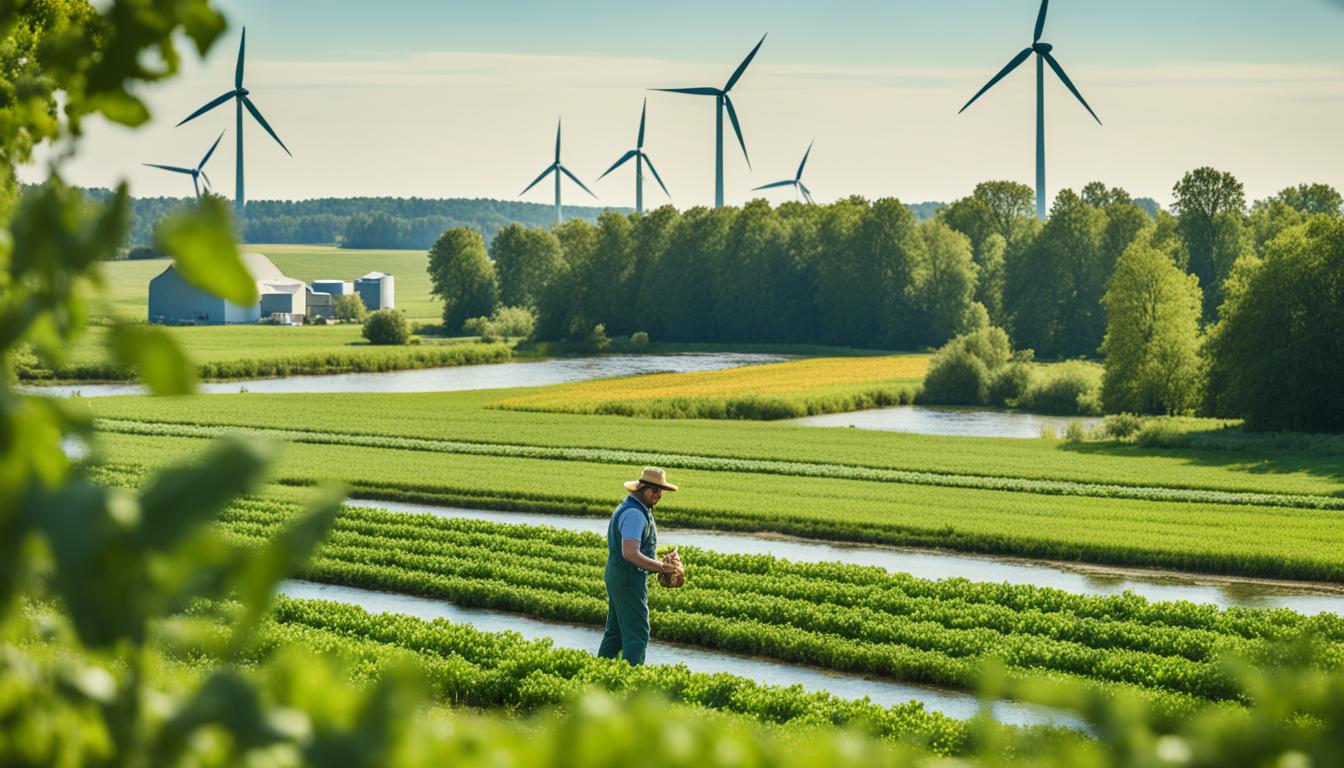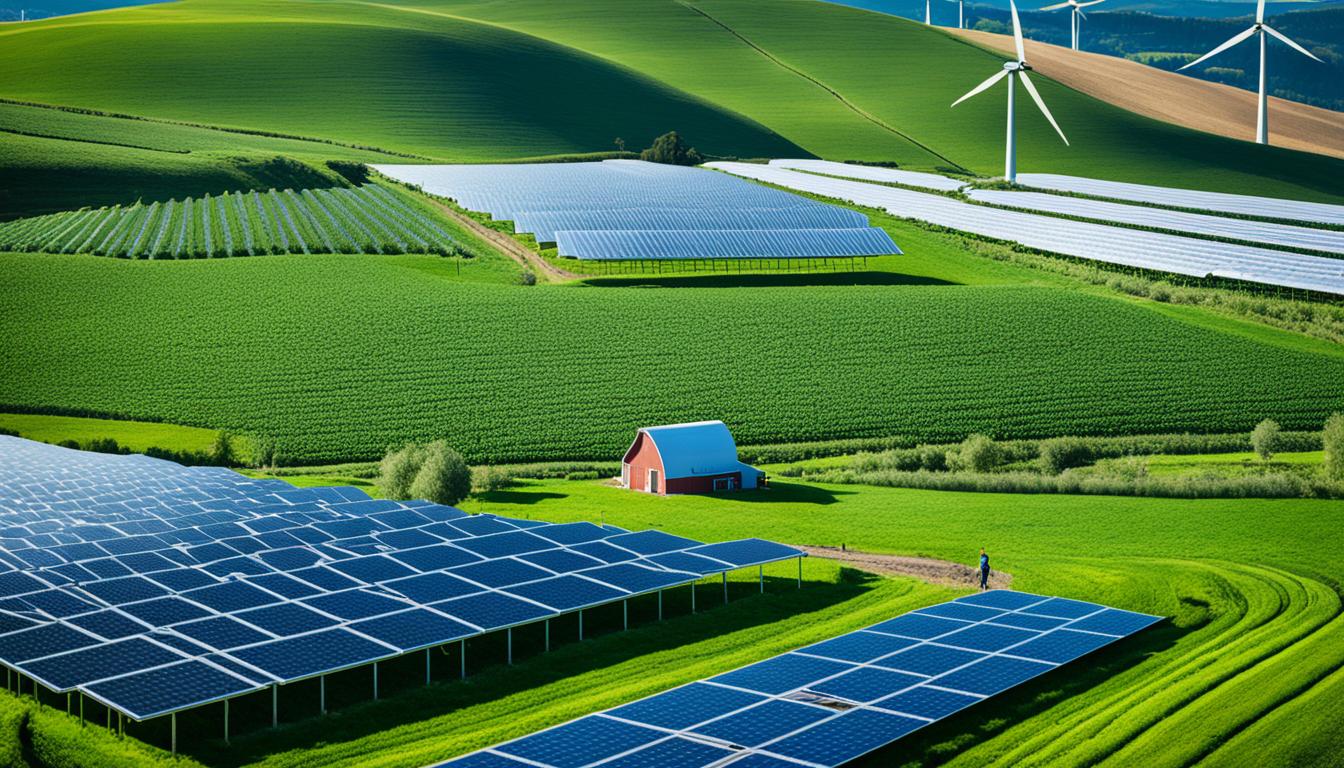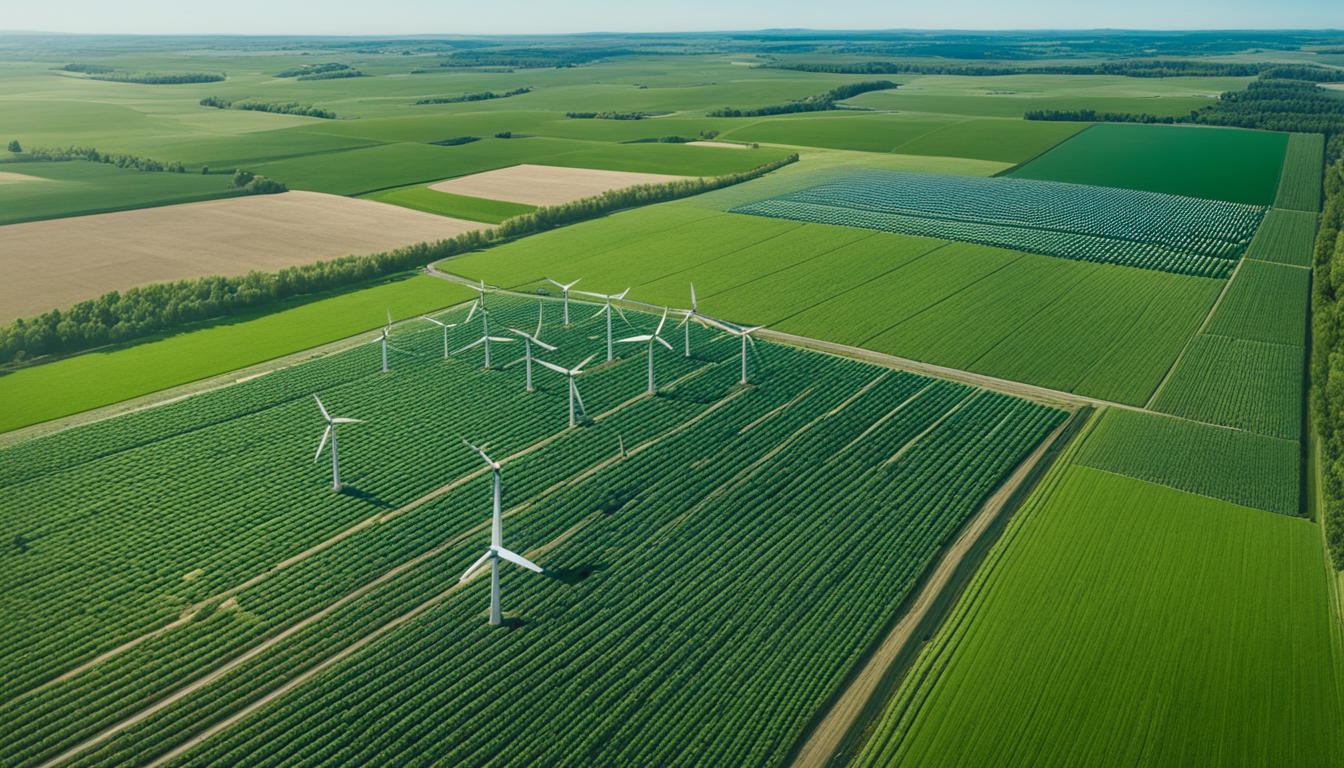In today’s world, we see the effects of human actions on the environment more clearly. Sustainable farming is key to fixing this issue. It’s a way to grow food that also protects our natural world. By learning about sustainable farming, you can help save the earth for future generations.
Sustainable farming uses many techniques to lessen the harm farming does to the environment. It helps keep soil healthy, protects many species, saves water, and fights climate change. This approach is vital for our planet’s health. Let’s look at how sustainable farming helps our communities and the earth.
The Importance of Sustainable Farming Practices
Sustainable farming is key to solving many problems our planet faces. It means we use resources now without taking away from future generations. This way, we take care of the environment, help communities, and support the economy.
Understanding the Concept of Sustainability
Sustainable farming is about keeping nature in balance. It focuses on keeping soil healthy, saving water, and using organic methods. These practices help protect the environment and ensure we have enough food for the future.
The Global Impact of Agriculture
Agriculture affects the health of our planet and the climate. Old farming ways use a lot of chemicals and harm the environment. But, if we use sustainable farming, we can fight climate change and protect nature.
| Sustainable Farming Practices | Benefits |
|---|---|
| Crop rotation and cover cropping | Improved soil health, reduced erosion, and enhanced biodiversity |
| Organic agriculture | Reduced chemical pollution, increased food safety, and support for rural livelihoods |
| Agroforestry systems | Carbon sequestration, water conservation, and the preservation of diverse ecosystems |
By choosing sustainable farming, we can make agriculture a solution to our problems. It’s about being productive and taking care of the environment at the same time. This way, farming can help everyone and protect our planet.
Environmental Conservation: A Key Benefit
Sustainable farming is key to protecting our planet. It helps keep our ecosystems balanced, saves biodiversity, and fights climate change. By using eco-friendly methods, farmers can make a big difference.
Sustainable farming helps protect biodiversity. Unlike traditional farming, which can harm many species, sustainable farming grows many crops and saves habitats. This helps many plants and animals thrive, keeping our ecosystems healthy.
Also, sustainable farming fights climate change. Techniques like no-till keep the soil rich in carbon, lowering farming’s carbon footprint. Using fewer chemicals also makes farming better for the planet.
| Sustainable Farming Practices | Environmental Benefits |
|---|---|
| Crop Rotation and Cover Cropping | Improved soil health, reduced erosion, and enhanced biodiversity |
| Integrated Pest Management | Reduced reliance on synthetic pesticides, protecting natural ecosystems |
| Agroforestry | Carbon sequestration, habitat preservation, and enhanced resilience to climate change |
By choosing sustainable farming, we help protect our environment. As consumers, buying from sustainable farms encourages more eco-friendly farming. This is good for our planet and future generations.
“Sustainable farming is not just about producing food – it’s about preserving the delicate balance of our planet and ensuring a healthy future for all.”
Preserving Soil Health and Fertility
Sustainable farming is key to keeping soil healthy and fertile. It’s the base of a strong farm. Two main strategies help: crop rotation and using cover crops.
The Role of Crop Rotation and Cover Crops
Crop rotation means changing crops to keep soil fertile. It adds nutrients and stops pests and diseases. This boosts soil health and helps many kinds of life by offering homes for good bugs.
Cover crops like grasses and legumes are planted between main crops. They keep the soil covered and stop it from washing away. These crops also help save water by making the soil better at holding moisture.
Minimizing Soil Erosion and Degradation
Methods like no-till farming and using buffer strips help prevent soil loss. They keep the soil’s structure and organic matter safe. This makes water cleaner and helps farms stay strong against climate change.
| Sustainable Farming Practice | Benefits for Soil Health |
|---|---|
| Crop Rotation | Replenishes nutrients, breaks pest and disease cycles, supports biodiversity |
| Cover Crops | Prevents erosion, improves water conservation, enhances soil structure |
| No-till or Reduced-till | Preserves soil structure and organic matter, reduces erosion |
| Buffer Strips and Contour Farming | Minimizes soil erosion, improves water quality |
“Healthy soils are the foundation for sustainable agriculture, supporting biodiversity and ensuring water conservation for future generations.”
Biodiversity: Sustaining Life on Earth
In sustainable farming, keeping biodiversity is key. Ecosystems full of different plants and animals are vital for our planet’s balance. By using sustainable farming, we help these environments thrive and keep our farms healthy for the future.
The Importance of Diverse Ecosystems
Diverse ecosystems are crucial for a sustainable future. They have many connections between species, making the land healthy. Pollinators and soil microbes are just a few examples of how each species helps farming stay strong and productive.
- Diverse ecosystems support many beneficial insects, birds, and small mammals that keep pests under control and maintain balance in farming.
- Having different plant species, like cover crops and native plants, prevents soil erosion, improves soil health, and gives homes to wildlife.
- Healthy, diverse ecosystems can better handle challenges like drought, pests, and diseases, making farming sustainable for the long term.
By focusing on environmental conservation and biodiversity, sustainable farmers create ecosystems that protect the land and all life it supports.
Protecting biodiversity in farming is crucial for the environment and for our food supply. It’s a smart move for a sustainable future. Keeping diverse ecosystems safe must always be a priority.
Water Conservation: A Crucial Aspect
Water conservation is key in sustainable farming. It’s vital for the long-term success of our farms. By using sustainable methods, we save water and help fight climate change.
Water-efficient irrigation systems are a big help in saving water. Technologies like drip and precision irrigation send water right to the roots. This cuts down on waste and boosts crop health.
Organic farming is also great for saving water. It makes soil better at holding water, so you don’t need to water as much. Adding things like compost and cover crops makes the soil stronger against droughts and climate changes.
Water conservation and fighting climate change go hand in hand. Sustainable farming cuts down on greenhouse gases. This makes your farm more resilient to environmental changes.
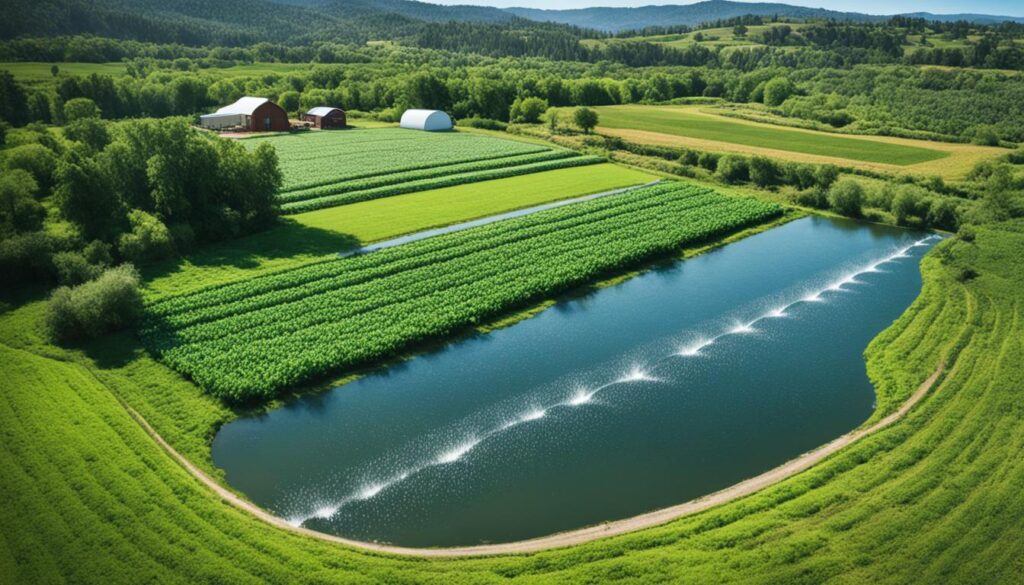
“Sustainable farming is not just about producing food – it’s about preserving the very resources that sustain us, including water. By prioritizing water conservation, we can ensure a brighter, more sustainable future for generations to come.”
Organic Agriculture: A Sustainable Approach
Organic agriculture is a key to a better future. It helps the environment and benefits farmers and consumers too.
The Benefits of Organic Farming
Organic farming focuses on soil health. It uses crop rotation and cover crops to boost soil health and biodiversity. This leads to better water conservation and less need for synthetic products.
- Improved soil fertility and structure
- Increased biodiversity and habitat preservation
- Reduced water pollution and efficient water usage
- Elimination of synthetic pesticides and fertilizers
Challenges and Misconceptions
Organic farming has many benefits, but some myths need clearing up. Some think it’s less productive or more costly. But studies show organic farming can be as good or better than traditional methods.
“Organic agriculture is not just about what we don’t do – it’s about what we do. We build soil fertility, enhance biodiversity and wastewater, and grow nutrient-dense food without synthetic inputs.”
Another issue is educating consumers. When people know how organic farming helps, they can make better choices. This supports a greener food system.
As we seek out sustainable food, organic farming shows us how to live with nature. It lets us grow food that’s good for us and the planet.
Why Are Sustainable Farming Important for Mitigating Climate Change
The world is facing a big challenge with climate change. Sustainable farming is key in fighting this crisis. By using climate-smart farming, farmers can help reduce climate change’s effects and keep our planet healthy.
Sustainable farming cuts down on greenhouse gas emissions. Old farming ways use a lot of fossil fuels, which add to carbon dioxide, methane, and nitrous oxide in the air. But, sustainable farming uses renewable energy and smart farming methods to save resources and waste less.
Practices like organic farming and agroforestry also help pull carbon from the air and store it in soil and plants. This is called carbon sequestration. It helps balance out greenhouse gas emissions and is vital for protecting the environment.
| Sustainable Farming Practices | Impact on Climate Change Mitigation |
|---|---|
| Renewable Energy Use | Reduced greenhouse gas emissions |
| Precision Farming Techniques | Optimized resource use and minimized waste |
| Organic Agriculture | Increased carbon sequestration in soil |
| Agroforestry | Enhanced carbon storage in vegetation |
By choosing sustainable farming, we can fight climate change, protect the environment, and make our food systems stronger. As we work towards a sustainable future, the importance of sustainable farming in tackling climate change is clear.
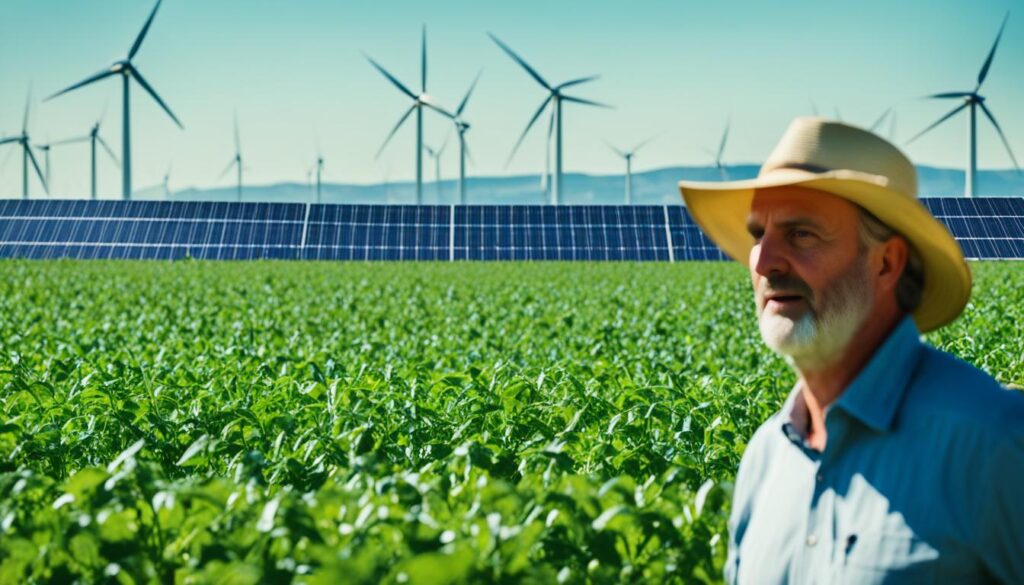
“Sustainable farming is not just an environmental imperative; it’s a crucial component of the global effort to combat climate change and secure a sustainable future for all.” – Dr. Jane Doe, Sustainable Agriculture Researcher
Ensuring Food Security for Future Generations
Climate change makes ensuring food security for the future very important. Sustainable farming, like organic agriculture, is key to solving this issue.
The Role of Sustainable Farming in Food Production
Methods like crop rotation, cover cropping, and integrated pest management boost food production and lessen harm to the environment. They make farms stronger against climate change effects like droughts and floods.
Organic farming, which doesn’t use synthetic fertilizers or pesticides, produces nutritious food and protects the land. This method fights climate change and secures food for the future.
| Sustainable Farming Practices | Benefits for Food Security |
|---|---|
| Crop Rotation | Improves soil fertility, reduces pest and disease pressures, and increases biodiversity |
| Cover Cropping | Enhances soil health, prevents erosion, and retains moisture for improved drought resilience |
| Integrated Pest Management | Reduces reliance on harmful chemicals, promotes natural predator-prey relationships, and minimizes environmental pollution |
| Organic Agriculture | Produces nutrient-dense foods without synthetic inputs, contributing to long-term food security and sustainability |
By using sustainable farming and organic methods, we can make sure there’s enough food for the future. We’ll also fight climate change and protect our planet.
“Sustainable farming is not just about growing food; it’s about nurturing the land, preserving biodiversity, and securing a future where everyone has access to healthy, nutritious food.”
Empowering Rural Livelihoods and Communities
Agroforestry and organic agriculture change rural life for the better. They help the environment and create jobs. They also make local food systems stronger.
Sustainable farming brings jobs to rural places. By growing different crops and using agroforestry, farmers earn more. This stops people from moving to cities and keeps families in their communities.
Organic agriculture helps small farmers be self-sufficient. They sell directly to consumers through markets and CSAs. This builds strong local food systems that make food more secure and bring people together.
| Sustainable Farming Approach | Social and Economic Benefits |
|---|---|
| Agroforestry |
|
| Organic Agriculture |
|
Rural communities gain a lot from sustainable farming. They protect the environment and build strong local economies. This way of farming changes farmers’ and community members’ lives for the better, leading to a sustainable future.
“Sustainable farming is not just about protecting the environment – it’s about empowering rural communities and creating a better future for all.”
Agroforestry: A Sustainable Farming Solution
Agroforestry is a new way to farm that mixes trees with crops or livestock. This method brings many benefits, making it great for today’s farming challenges.
Understanding the Concept of Agroforestry
Agroforestry focuses on the link between trees, crops, and livestock. It combines these to make farms more diverse and strong. This method is different from just growing one crop, using biodiversity and environmental conservation principles.
Benefits of Agroforestry Systems
- Improves soil health by helping nutrients cycle better, adding organic matter, and stopping soil erosion.
- Boosts biodiversity by giving homes and food to many plants and animals.
- Helps with environmental conservation by storing carbon, controlling the weather, and protecting water.
- Increases farmers’ income, making them more stable and resilient.
- Offers many products, like wood, fruits, fodder, and medicines.
By using agroforestry, farmers can create a sustainable future. This approach helps the land and communities. Agroforestry is a key solution that combines agroforestry, biodiversity, environmental conservation, and soil health.
Overcoming Challenges in Sustainable Farming
Switching to sustainable farming has many benefits, but it’s not easy. Farmers and communities wanting to use organic agriculture, rural livelihoods, and climate change mitigation face many challenges. These include not having enough resources and infrastructure issues.
One big challenge is needing more money and education. Sustainable farming often costs more at first because of special equipment and training. Finding money and getting the right knowledge is hard, especially for small farmers.
- Lack of access to financing and government support programs
- Limited availability of educational resources and extension services
- Resistance to change within traditional agricultural communities
There’s also a lack of the right infrastructure, like places to process and store food. This makes it hard for farmers to sell their organic products. It limits their chance to make a living from farming.
To beat these challenges, we need a plan. This plan should involve government, experts, and leaders from the community. More money for research, training farmers, and better supply chains can help. Working together can make sustainable farming more common.
“Sustainable farming is not just about the environment – it’s about empowering rural communities and ensuring food security for generations to come.”
By tackling these issues and creating a supportive environment, we can move faster to a sustainable and strong farming future.
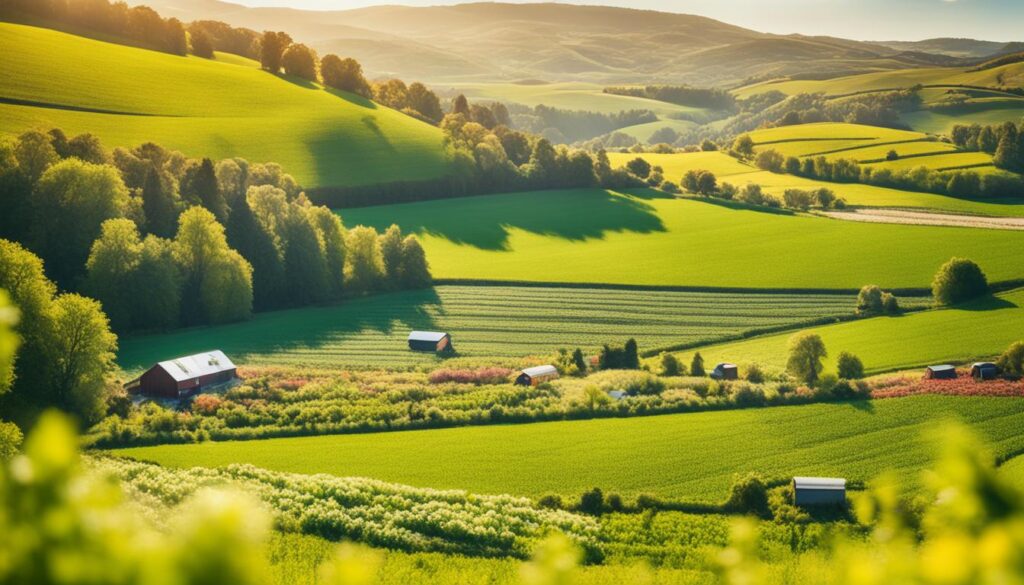
The Role of Consumers and Policy Makers
Sustainable farming is key to solving today’s big problems like saving the environment and ensuring food for everyone. It needs both consumers and policymakers to work together. When we all make choices that support sustainable farming, we can make a big difference.
Promoting Sustainable Farming Through Consumer Choices
We, as consumers, can change the future of farming. Buying organic and local products helps farmers who care for the earth. This choice is good for the planet and helps communities in rural areas. Choosing organic farming means we use fewer harmful chemicals, which helps fight climate change.
Consumers can also spread the word about sustainable farming. Sharing our choices with others can inspire them to buy better products. This helps increase demand for food security and rural livelihoods.
Policy Initiatives and Support for Sustainable Agriculture
Policymakers are also crucial in supporting sustainable farming. They can pass laws and provide help for farmers to use sustainable methods. This can include giving farmers money or tax breaks for organic farming.
They can also fund research to improve sustainable farming. This gives farmers new ways to grow food that’s good for the earth.
Rules and standards can push farmers to take care of the land and protect nature. Clear guidelines help farmers focus on soil health, saving water, and keeping nature rich in life.
| Policy Initiatives | Impact on Sustainable Farming |
|---|---|
| Financial Incentives | Encourage farmers to adopt sustainable practices |
| Research and Development | Advance innovative sustainable farming techniques |
| Regulations and Standards | Promote environmental conservation and responsible land management |
Together, consumers and policymakers can make farming more sustainable. This approach helps the earth, communities, and our future.
Conclusion
This article has shown how important sustainable farming is. It helps with things like keeping the environment safe, making soil healthy, and saving water. By using organic farming and agroforestry, we can fight climate change and make sure we have enough food for the future.
It’s important for everyone to work together to make farming more sustainable. This means farmers, policymakers, and consumers all playing a part. By knowing why sustainable farming is key, we can make better choices and help the planet.
Choosing sustainable farming is essential for our planet and the future. Let’s join hands to build a better agricultural system. One that takes care of the land, protects nature, and gives us a bright future.
